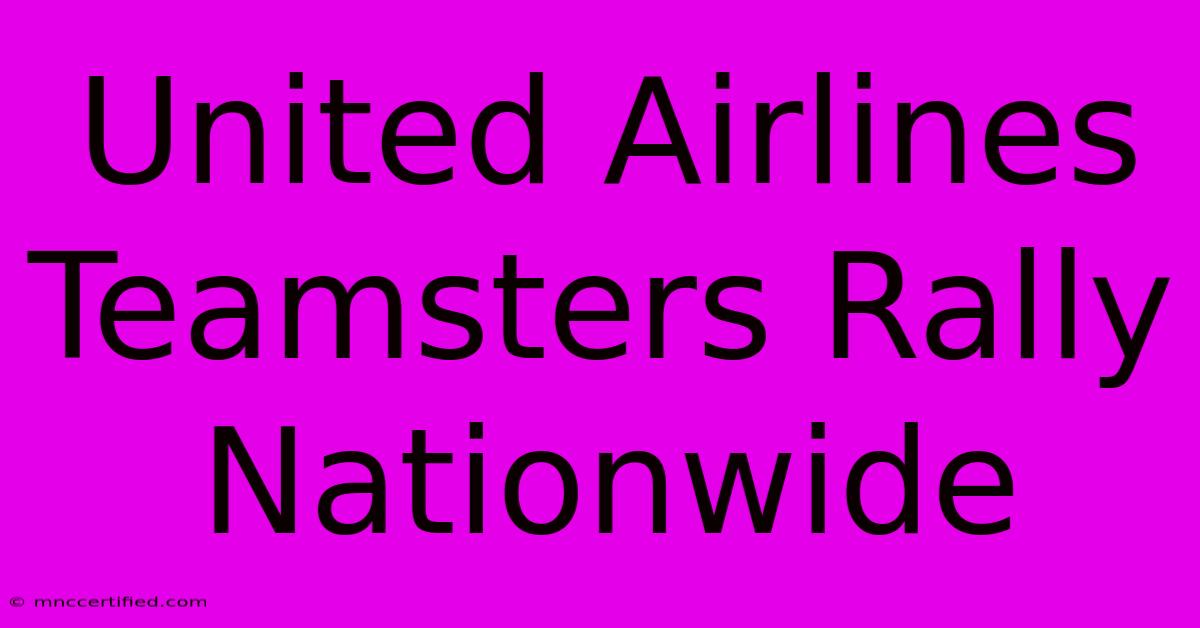United Airlines Teamsters Rally Nationwide

Table of Contents
United Airlines Teamsters Rally Nationwide: A Fight for Fair Contracts and Better Working Conditions
The nationwide rallies organized by Teamsters representing United Airlines workers signal a significant escalation in the ongoing contract negotiations. These demonstrations highlight key concerns regarding pay, benefits, and overall working conditions, impacting thousands of employees and potentially affecting air travel nationwide. This article delves into the specifics of the rallies, the demands of the Teamsters, and the potential consequences for both employees and United Airlines.
Understanding the Core Issues: Why are Teamsters Rallying?
The core of the dispute lies in the Teamsters' fight for a contract that reflects the contributions of their members and addresses the challenges they face daily. Key demands often include:
-
Higher Wages: Teamsters are pushing for substantial wage increases to keep pace with inflation and the rising cost of living. They argue that their current wages don't adequately compensate for the demanding nature of their jobs and the increasing responsibilities they shoulder.
-
Improved Benefits: Access to affordable and comprehensive healthcare is a major concern. The Teamsters are advocating for improvements to their health insurance plans, including lower premiums and deductibles, and enhanced coverage for prescription drugs. Retirement security is also a crucial element, with demands for improved pension plans and 401(k) matching contributions.
-
Better Working Conditions: Many Teamsters report issues with overwork, inadequate staffing levels, and stressful working environments. They're advocating for measures to reduce workloads, improve safety protocols, and create a more respectful and supportive workplace culture. This might include improvements to scheduling flexibility and better protections against harassment.
-
Job Security: Concerns about job security and the potential for outsourcing are also prevalent. The Teamsters are fighting to protect existing jobs and ensure fair treatment for all employees.
The Impact of the Nationwide Rallies: A Ripple Effect
These nationwide rallies aren't just symbolic gestures; they have a tangible impact on several fronts:
-
Public Awareness: The rallies aim to raise public awareness of the issues facing United Airlines Teamsters and garner support for their demands. Increased public awareness can influence public opinion and potentially pressure United Airlines to negotiate in good faith.
-
Negotiating Power: Large-scale demonstrations strengthen the negotiating position of the Teamsters. A united front of workers can put significant pressure on the company to concede on key issues.
-
Potential Disruptions: While the rallies themselves are largely peaceful demonstrations, the potential for service disruptions cannot be entirely ruled out if the negotiations remain stalled. This could impact flight schedules and create inconvenience for travelers.
-
Long-Term Implications: The outcome of these negotiations will have long-term implications for the working conditions and compensation of thousands of United Airlines employees. The success or failure of these rallies will set a precedent for future contract negotiations within the airline industry.
Looking Ahead: What's Next for United Airlines and the Teamsters?
The future of the negotiations remains uncertain. The success of the rallies in influencing the outcome depends on several factors, including public support, the willingness of United Airlines to compromise, and the continued unity and determination of the Teamsters. Continued monitoring of news sources dedicated to labor relations and aviation news will be crucial for tracking the progress of the negotiations and the impact of these rallies. Furthermore, understanding the specific demands of the local chapters of the Teamsters involved can provide a more nuanced perspective on the issues at hand.
Keywords: United Airlines, Teamsters, Nationwide Rally, Contract Negotiations, Labor Dispute, Fair Wages, Benefits, Working Conditions, Job Security, Airline Industry, Labor Union, Collective Bargaining, Employee Rights.
On-Page SEO: The strategic use of keywords throughout the article, including header tags (H2, H3), bold text, and natural language integration, optimizes the content for search engines.
Off-Page SEO: Promoting this article through social media, relevant forums, and engaging in discussions on related websites and blogs will enhance its visibility and reach, driving organic traffic. Building backlinks to this article from reputable sources will further improve its search engine ranking.

Thank you for visiting our website wich cover about United Airlines Teamsters Rally Nationwide. We hope the information provided has been useful to you. Feel free to contact us if you have any questions or need further assistance. See you next time and dont miss to bookmark.
Featured Posts
-
Adopt Me Cross Trading Discord
Nov 28, 2024
-
Investing The Last Liberal Art
Nov 28, 2024
-
Copy Trading Multiple Accounts
Nov 28, 2024
-
Michael Roy Fisher Investments
Nov 28, 2024
-
Israel Hezbollah Truce Cautious Optimism Lingering Fears
Nov 28, 2024